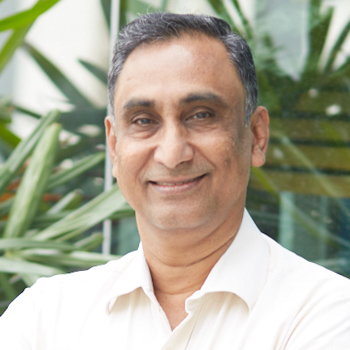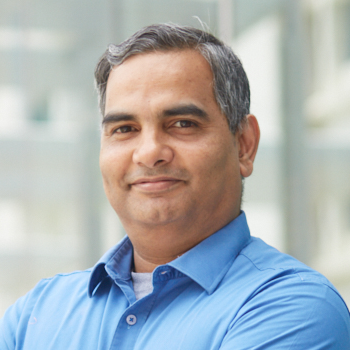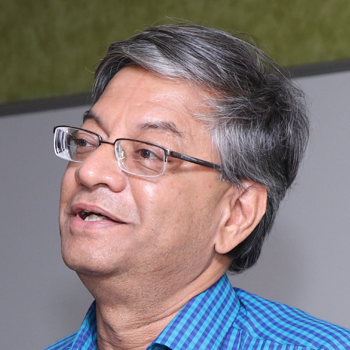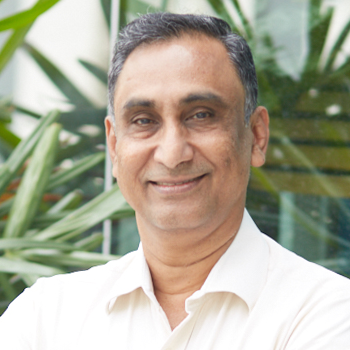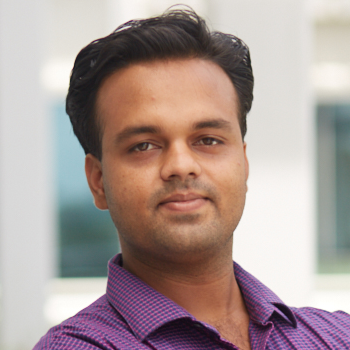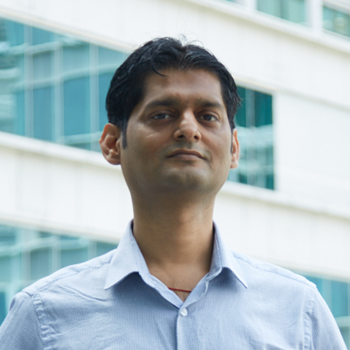
Our Focus is on product development and consultancy in the fields of data analysis, process modeling and control, fault diagnosis and gross error detection, sensor diagnostics, decision support, expert systems and optimization.
Meet Us
Our Focus is on product development and consultancy in the fields of data analysis, process modeling and control, fault diagnosis and gross error detection, sensor diagnostics, decision support, Expert systems and optimization.
Our Founders’ experience is a result of years of valuable research and industrial consultancy across a wide spectrum of areas. Our success results from understanding the needs of our customers, agility in delivery, keeping pace with the competitiveness of our customers and strong capabilities in offering complete solutions to complex industry problems. We have a pool of well-experienced and skilled personnel largely from the best academic institutes in India and abroad.
MISSION
To deliver creative, complete and holistic solutions to our clients through a combination of skill,
domains expertise and deep understanding of the needs of the customer
Our Culture
The founding members have influenced and shaped the corporate culture of the company. They brought with them less traditional management strategies that include fostering creativity, research orientation, and employee freedom. The collective problem solving attitude that has been inculcated has clearly been the key to the company’s success

OUR TEAM
Prof.Shankar Narasimhan is currently a professor in the department of Chemical Engineering at IIT Madras. He received a B.Tech in Chemical Engineering from IIT Madras and a PhD in Chemical Engineering from Northwestern University. His major research interests are in the areas of Data Mining, Process Design and Optimization, Fault Detection and Diagnosis and Fault Tolerant Control. He has co-authored several important papers and a book titled “Data Reconciliation and Gross Error Detection: An Intelligent Use of Process Data”, which has received critical appreciation in India and abroad. He is a fellow of the Indian National Academy of Engineering.
Raghunathan Rengaswamy is a Professor at the Department of Chemical Engineering, IIT Madras. Prior to this, he was Professor, Chemical Engineering and co-director of the Process Control and Optimization Consortium (PCOC) at Texas Tech University, Lubbock, TX USA, Associate and full Professor at Clarkson University, Potsdam, NY and Assistant Professor at IIT Bombay, Mumbai, India. He has also been a visiting professor at Purdue University, USA, University of Delaware, USA and University of Alberta, Canada. He has Bachelor's degree in Chemical Engineering from IIT Madras, India and a PhD in Chemical Engineering from Purdue University, West Lafayette, IN, USA. His PhD work explored AI approaches and leveraged syntactic pattern recognition for identifying abnormalities from a variety of data types. His PhD work also explored connections between statistical classifiers and neural network approaches. Based on similar themes, his current major research interests are in the areas of Data Analytics, Fault Detection and Diagnosis (FDD), development of Sensor Placement (SP) algorithms for FDD, and Controller Performance Assessment (CPA). His research interests also span energy systems and droplet microfluidics. In the area of energy systems, his group works on development of hydrogen fuel cells, redox flow batteries and health monitoring of Li-ion batteries. His group is one of the few groups in the world working on development of tubular polymer exchange membrane fuel cells – the current commercial PEM fuel cells are planar. In the field of redox flow batteries, his group works on improving the flow battery performance through design and electrolyte modifications. His group has also developed a rapid diagnostic technique through the use of chirp signals that can potentially identify state-of- charge (SOC) and state-of- health (SOH) of Li-ion batteries in a very short period of time. His work on development of a rational computational approach for the design of droplet microfluidic systems has recently been awarded a US patent. Rengaswamy has worked in these areas for more than twenty years and has published more than 100 international journal articles. Overall, his work has been cited more 7000 times with an h-index of 37 (Google Scholar). He was elected a fellow of Indian National Academy of Engineering in November 2017. Rengaswamy was the recipient of the Young Engineer Award for the year 2000 awarded by the Indian National Academy of Engineering (INAE) for outstanding engineers under the age of 35. He guided a BS project "Qualitative Simulation in Process Engineering" that won an award as one of the most innovative thesis at Bachelor's level (all disciplines) awarded by INAE. His paper on fault diagnosis was awarded the CAST Directors' Award for the Best Poster Presentation at the AIChE Annual meeting in Los Angeles, Nov 2000. A news item "Networking Sensors – No Easy Task" was published on his work on sensor network design in the newsletter Inside R&D published by John Wiley & Sons, NY, USA in 2000. He was a keynote speaker at the 4th International Federation of Automatic Control (IFAC) workshop on "On-line Fault Detection and Supervision in the Chemical Process Industries" held in Korea, 2001. A paper that he co-authored was chosen by the International Federation of Automatic Control (IFAC) for the Best Paper Prize, for the years 2002-2005, in Engineering Applications of Artificial Intelligence Journal in the category - Application-oriented paper on Symbolic AI Approaches. His research has been funded by federal and state agencies such as the US-DOE, NSF, ACS-PRF, NYSERDA, US-DOD, DST, NMRL and companies such as Honeywell, Nanodynamics, GE and KBR. A company SysEng LLC, started at Lubbock TX, USA based on his research work on droplet microfluidic system simulation and optimization was granted a NSF STTR Phase 1 award.
Professor Venkat Venkatasubramanian is Samuel Ruben-Peter G. Viele Professor of Engineering in the Department of Chemical Engineering, Professor of Computer Science (Affiliate), and Professor of Industrial Engineering and Operations Research (Affiliate) at Columbia University in the City of New York. He earned his Ph. D. in Chemical Engineering at Cornell, M.S. in Physics at Vanderbilt, and B. Tech. in Chemical Engineering at the University of Madras, India. Venkat worked as a Research Associate in Artificial Intelligence in the School of Computer Science at Carnegie-Mellon University. He taught at Purdue University for many years, before returning to Columbia in 2011. At Columbia, Venkat directs the research efforts in the Complex Resilient Intelligent Systems Laboratory. He is also the founding Co- Director of the Center for the Management of Systemic Risk, a transdisciplinary center focused on understanding how complex systems fail in order to prevent or mitigate such failures in the future, with faculty from a number of departments at Columbia University. By inclination and education, Venkat is attracted to fundamental questions that are at the intersection of different disciplines. A leitmotif in his work is understanding emergent phenomena in self-organized complex systems, particularly using artificial intelligence, statistical mechanics, game theory, and systems engineering concepts and techniques. Venkat's research contributions have been in the areas of process fault diagnosis and risk management, materials discovery analytics, pharmaceutical engineering, and income inequality. Prof. Venkatasubramanian received the Norris Shreve Award for Outstanding Teaching in Chemical Engineering three times at Purdue University. He won the Computing in Chemical Engineering Award from AIChE and is a Fellow of AIChE. In 2011, the College of Engineering at Purdue University recognized his contributions with the Research Excellence Award. He is a past-President of the Computer Aids for Chemical Engineering (CACHE) Corporation. He currently serves as an Editor for Computers and Chemical Engineering. His new book, How Much Inequality is Fair? Mathematical Principles of a Moral, Optimal, and Stable Capitalist Society, was published in 2017. Venkat has been a consultant to a number of global corporations on the application of artificial intelligence and data science techniques for process diagnosis and safety, materials design, and pharmaceutical engineering. Venkat's other interests include comparative theology, classical music, and cricket.
Prof.Shankar Narasimhan is currently a professor in the department of Chemical Engineering at IIT Madras. He received a B.Tech in Chemical Engineering from IIT Madras and a PhD in Chemical Engineering from Northwestern University. His major research interests are in the areas of Data Mining, Process Design and Optimization, Fault Detection and Diagnosis and Fault Tolerant Control. He has co-authored several important papers and a book titled “Data Reconciliation and Gross Error Detection: An Intelligent Use of Process Data”, which has received critical appreciation in India and abroad. He is a fellow of the Indian National Academy of Engineering.
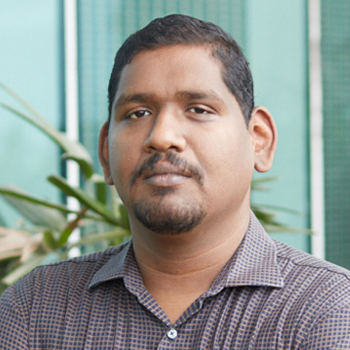
Ganesh Sankaran
Chief Technology Officer
Ganesh Sankaran graduated from IIT Madras in 2013 with a Dual Degree in Chemical Engineering. He joined the company as an application developer and officiated as the chief project manager and client interface. With his recent promotion as the CTO, Ganesh's role will support the project leads in the development of solution architecture, designing project roadmaps for successful management and delivery of projects. His technical skills and vision will be useful in steering and supporting the company's growth strategy in future.
Arjun is an interdisciplinary Materials Science & Mechanical Engineer with interests in system modeling and optimization spanning seemingly diverse domains of manufacturing, thermal & refrigeration systems, phase change systems & fuel cells, utilizing analytics for enhancing core engineering applications
